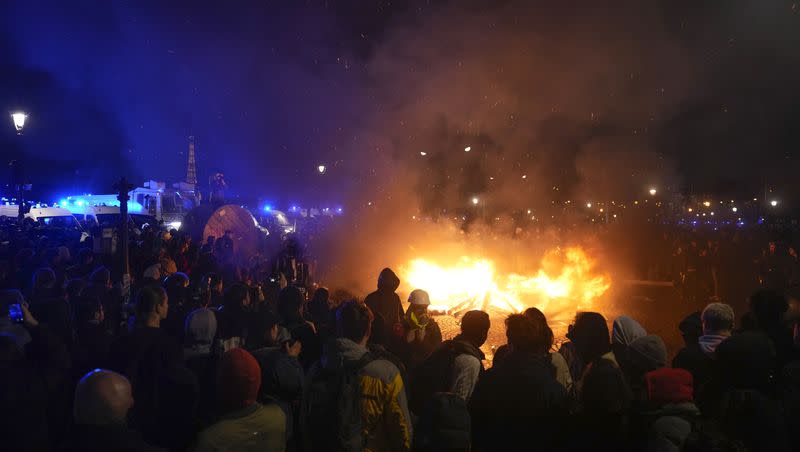Opinion: What uncertainty with Europe’s ‘big three’ means for Ukraine’s survival

- Oops!Something went wrong.Please try again later.
- Oops!Something went wrong.Please try again later.
Ukraine has issued an urgent request for artillery shells, ammunition and financial assistance as it attempts to halt the most recent Russian offensive. Russian casualties now top 200,000 and the battle of Bakhmut is reminiscent of World War I with trench warfare and even hand-to-hand combat. Ukraine’s casualties during the war may now top 120,000 with an overall population one-fourth of Russia’s.
Almost all European countries have voiced support for Ukraine and condemned Russian President Vladimir Putin’s invasion of a sovereign nation. Poland and Slovakia have even pledged to send fighter aircraft to their besieged neighbor. However, domestic challenges in the three most powerful Western European countries — Germany, the United Kingdom and France — may be slowing much-needed tangible contributions to Ukraine.
Germany’s Chancellor Olaf Scholz is speaking loudly but carrying a small stick. He has proclaimed major changes in Germany’s defense posture (Zeitenwende) and vast increases in military spending, but only a trickle of assistance has reached Ukraine. Scholz is hamstrung by a three-party coalition government of his Social Democratic Party along with the liberal Greens and the conservative Free Democratic Party. However, much more can be given by Europe’s largest economy, and it is desperately needed now.
Related
The U.K. has a new prime minister, Rishi Sunak, who is also a graduate of the Stanford Business School. He is dynamic and a breath of fresh air when compared to the eccentric Boris Johnson. However, the U.K. is suffering from economic disruptions caused by its Brexit divorce from the European Union, and its overall relationship with parts of the continent is tenuous. In addition, Sunak’s Conservative Party is currently less popular than the rival Labour Party.
I currently live in France, and President Emmanuel Macron has fallen on tough times. We have recently experienced eight major episodes of strikes and demonstrations as people have protested against Macron’s quest to raise the retirement age from 62 to 64. His argument about restoring fiscal stability to France’s generous pension system makes some sense, and France has the lowest retirement age among major European countries. However, two-thirds of the French oppose the pension reforms. This week the legislation received the approval of the French Senate but then the government supporting Macron invoked a clause to enact the bill without a favorable vote in the more powerful Chamber of Deputies. This was legal, but the optics were terrible. Macron is in his second term and cannot be reelected, so he is a lame duck. His party was created when he first ran for president in 2017, and it may not survive once he leaves office in 2027. French politics are in flux, and the focus is on domestic issues with scant attention being paid to Ukraine.
These uncertainties in Europe’s Big Three do not bode well for Ukraine’s quest to survive. The United States continues to provide most of the financial assistance and military equipment to Ukraine, even though it is thousands of miles away from Europe. And domestically, the two leading Republican candidates for the 2024 presidential election, Donald Trump and Ron DeSantis, are now openly questioning the wisdom of U.S. assistance to Ukraine.
Related
Meanwhile, President Xi Jinping of China will soon visit Moscow for the first time since Putin ordered the incursion into Ukraine in 2022. In blunt terms, U.S. relations with Russia and China are more tumultuous than at any other time in the 21st century. During his visit, Xi has three options. He can continue to voice support for Moscow in vague terms, maintaining the status quo. The second option would be to propose a concrete peace plan for Ukraine, but it is difficult to see how Putin and Ukrainian President Volodymyr Zelenskyy could jointly agree to such a proposal. The final option would be for Xi to offer significant financial and military assistance to Putin in his quest to conquer Ukraine, an action which could plunge Europe, the United States and Asia into an even more precarious era.
Despite their domestic problems, it is time for the countries of Europe to step forward immediately and provide unprecedented military and financial support to Ukraine, and this action should be spearheaded by Berlin, London and Paris. What is at stake is not only Ukraine’s survival, but also the future viability of European unity and autonomy.
Earl Fry is a professor emeritus of political science at BYU and have written several books on U.S. foreign relations.

